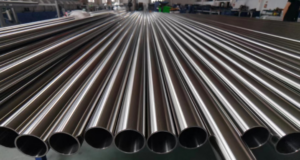Monel alloy, known for its remarkable resistance to corrosion and high strength, is a preferred material in various demanding applications. Whether you’re considering it for marine engineering, chemical processing, or aerospace components, understanding the pros and cons of Monel alloy is crucial. This article provides an in-depth look at the pros and cons of Monel alloy to help you make an informed decision.

Pros and Cons of Monel Alloy: What You Should Know
Pros of Monel Alloy:
- Exceptional Corrosion Resistance
One of the standout features of Monel alloy is its excellent resistance to corrosion. It performs exceptionally well in acidic and alkaline environments, as well as in seawater. This makes it an ideal material for marine applications, chemical processing plants, and other environments where corrosion is a significant concern. - High Strength and Durability
Monel alloy is known for its impressive strength and durability. It maintains its mechanical properties over a wide range of temperatures, from sub-zero to extreme heat. This characteristic makes it suitable for high-stress applications, such as in aerospace and oil and gas industries. - Resistance to Biofouling
In marine environments, biofouling—where marine organisms accumulate on surfaces—can be a major issue. Monel alloy is resistant to biofouling, reducing maintenance and increasing the longevity of marine equipment like propeller shafts and seawater valves. - Good Weldability and Machinability
Despite its toughness, Monel alloy is relatively easy to machine and weld. This property allows for the creation of complex components and assemblies without sacrificing material integrity, making it a versatile choice for various industrial applications. - Excellent Performance in High-Pressure Environments
Monel alloy’s ability to withstand high pressure makes it ideal for applications in oil and gas extraction, deep-sea operations, and high-pressure chemical processing.
Cons of Monel Alloy:
- High Cost
One of the primary disadvantages of Monel alloy is its cost. The high nickel content and complex manufacturing process make it significantly more expensive than other materials like stainless steel. This can be a limiting factor for budget-sensitive projects. - Difficulty in Cold Working
While Monel alloy is strong and durable, its high strength also makes it challenging to work with at lower temperatures. Cold working can be difficult, requiring specialized equipment and techniques, which can increase production time and costs. - Limited Availability
Monel alloy is not as widely available as more common materials like carbon steel or aluminum. This limited availability can lead to longer lead times for procurement, especially for custom orders or large quantities. - Potential for Galvanic Corrosion
When Monel alloy comes into contact with dissimilar metals in the presence of an electrolyte, there is a risk of galvanic corrosion. This can be mitigated with careful material selection and protective coatings, but it remains a consideration in multi-material assemblies. - Heavy Weight
Compared to other metals like aluminum or titanium, Monel alloy is relatively heavy. This can be a drawback in applications where weight is a critical factor, such as in aerospace or automotive design.
Conclusion
Monel alloy is a highly durable and corrosion-resistant material with numerous benefits, particularly in harsh environments. However, its high cost and some of its working challenges make it essential to weigh these factors against the specific needs of your project.
Why Choose Huaxiao Alloy?
Thank you for reading our article and we hope it can help you to have a better understanding of the pros and cons of Monel alloy. If you are looking for suppliers and manufacturers of Monel Alloy, we would advise you to visit Huaxiao Alloy.
As a leading supplier of Monel alloy from Shanghai China, Huaxiao Alloy offers customers high-quality Monel K500 and Monel 400 at competitive prices.



